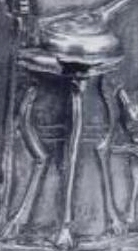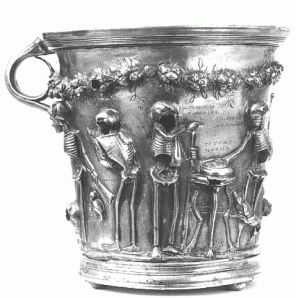The Tripod of Truth
 When designing the cover for the first edition of my Jackson Barwis ebook, I used a photo of a replica of a tripod that had been discovered in Herculaneum. That seemed a good choice at the time, but now I realize that I overlooked the perfect tripod — the one portrayed at the center of the clearest artistic portrayal of Epicurean ideas that survives from the ancient world: the Boscoreale Cup!
When designing the cover for the first edition of my Jackson Barwis ebook, I used a photo of a replica of a tripod that had been discovered in Herculaneum. That seemed a good choice at the time, but now I realize that I overlooked the perfect tripod — the one portrayed at the center of the clearest artistic portrayal of Epicurean ideas that survives from the ancient world: the Boscoreale Cup!
I first blogged about the Boscoreale cup on June 30 of 2010, and even dedicated a permanent page to the topic of Epicurean art in the ancient world.
I have therefore revised the Jackson Barwis ebook cover to portray this direct link between the tripod and Epicureanism. It has frequently been remarked on the internet how the cup portrays Epicurus with his hand on the bread or cake that is on the tripod, and how an eager piglet is at Epicurus’ feet – a direct reference to the same allusion that Horace noted in his poetry (“Think of me fat and sleek and in good keeping, when you wish to laugh, a hog of Epicurus’ herd.” Horace – Letter IV to Albius Tibullus)
In this post, however, I would like to highlight an aspect that escaped me before: It was a central insight of Epicurus that many of the defects in Platonic and Aristotelian philosophy stemmed from their improper reliance on “reason” as the sole means of determining truth, to the detriment of following the clear evidence of Nature. Epicurus therefore grounded his tests of truth — his canon of truth – on the three foundations that Nature has provided — the senses, the pain/pleasure mechanism, and the anticipations. Epicurus emphatically endorsed the importance of reason, but only in its proper place: as a secondary tool, never standing alone: for only the three legs of the canon provide men with direct contact with reality.
Here is one statement of these views, as contained in the defense of Epicurus by Torquatus, in Cicero’s On The Ends of Good And Evil:
Theoretical logic, on which your Platonic school lays such stress, Epicurus held to be of no assistance either as a guide to conduct or as an aid to thought. In contrast, he deemed Natural Philosophy to be all-important. Natural Philosophy explains to us the meaning of terms, the nature of cause and effect, and the laws of consistency and contradiction. A thorough knowledge of the facts of Nature relieves us of the burden of superstition, frees us from fear of death, and shields us against the disturbing effects of ignorance, which is often in itself a cause of terrifying fears. A knowledge of those things that Nature truly requires improves the moral character as well. It is only by firmly grasping a well-reasoned scientific study of Nature, and observing Epicurus’ Canon of truth that has fallen, as it were, from heaven, which affords us a knowledge of the universe. Only by making that Canon the test of all our judgments can we hope always to stand fast in our convictions, undeterred and unshaken by the eloquence of any man.
It is therefore significant to note the portrayal of Zeno on the Boscoreale cup. Zeno was the founder of Stoicism, which was largely a derivative of the Platonic and Aristotelian idealization of “logic” and “reason.” The artist of the cup therefore portrayed Zeno resting his evil eye, framed with a pointing and accusatory finger — on a staff, a single pole. There is no way to be certain of this, but I now suspect this is a portrayal of the Platonists’ errant reliance on the single staff of logic (or “reason”), an artistic allusion to this fatal defect of the Platonic/Aristotelian philosophies.
To my great regret I have been unable since last year to locate better images of the Boscoreale cup. Nor, more importantly, have I been able to locate detailed descriptions of the engravings that are present on the cup. Perhaps one of the engravings would invalidate the observation that the pointing hand resting on the single staff are of philosophic relevance, but until I am able to obtain more information I will have to simply file this observation under idle speculation.
In the meantime, those who appreciate the wisdom of Epicurus can use the portrayal on the Boscoreale cup as a reminder of how they themselves may be fat, sleek, and in good keeping — a hog in Epicurus’ herd — by studying and applying Epicurus’ insights into “the tripod of truth.”

